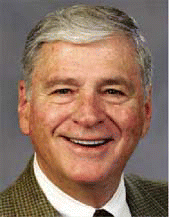WASHINGTON, DC-Generosity was the main topic of the American Academy of Otolaryngology-Head and Neck Surgery’s 2007 John Conley Lecture on Medical Ethics by Rev. William G. Enright, PhD, Executive Director of the Lake Family Institute on Faith and Giving at the Center on Philanthropy, Indiana University, at the opening ceremony of this year’s annual meeting. Drawing on Christian, Jewish, and Islamic traditions, poets, philosophers, and other writers, Dr. Enright described generosity as a virtue and a practice of the medical profession, and stated his belief that the issues involved in the practice of medicine involve one’s soul and its continuous nourishment.
Explore This Issue
November 2007Dr. Enright stated that the soul of medicine is in its calling. When medicine becomes a career or a mere job, it loses its soul. He told the attending doctors that the practice of medicine is your way of building a cathedral for your soul. He cautioned that the real world in which doctors work-the world of HMOs, insurance companies, ambulance chasers, enormous debt that new doctors have from their medical education-eats away at the historically sacred relationship between the patient and the doctor. Dr. Enright asked, How, amidst this milieu of bureaucratic overload and often the pursuit of a faceless fiscal deficiency, do we nourish our souls?
His answer is: by the practice of generosity, through which one can achieve a deeper spiritual connection to one’s chosen work. This practice involves how we are and what we are. The routes of authentic generosity are rooted in one’s sense of awe, he told listeners. Medicine, he claims, is about the capacity to value human life as a holy thing, and to recognize the life of total strangers as being as valuable as our own.
 The soul of medicine is in its calling. When medicine becomes a career or a mere job, it loses its soul.
The soul of medicine is in its calling. When medicine becomes a career or a mere job, it loses its soul.
-William G. Enright, PhD
Dr. Enright cited the French ethical philosopher Emmanuel Lévinas’ description of the experience of a doctor looking into the face of a patient as a moment of epiphany-when the face speaks, and calls to the doctor. Lévinas writes, The face asks that I not leave it alone, so I answer, here I am. Dr. Enright, like Lévinas, views this moment as both holy and ethical. We humans are all responsible for each other. Doctors are responsible for the fate of their patients; patients are responsible for the well-being of our physicians.
How Does It Begin?
The practice of generosity begins in welcome-a hospitality that offers whatever the host has that meets need of the guest, according to the author Arthur W. Frank. The renewal of generosity is hastened, according to Frank, if participants in the medical relationship think of themselves as hosts and guests rather than as patients and professionals, or as consumers and providers.
Dr. Enright believes that generosity can be nurtured by taking the time to reclaim the ancient practice of soul talk. As an example, he cited Jews who reserve the Days of Awe (i.e., the time between Rosh Hashanah and Yom Kippur) to take inventory of their souls. One must take the time to think about the issues of one’s soul, how one is living and how one wants to live. It’s only as we take time to listen to our souls that we wake up to that sacred storyline lurking beneath the surface of our respective autobiographies, he said. Generosity and gratitude are kissing cousins-they nurture each other. Generosity births gratitude, which, in turn, expresses itself as generous giving.

Dr. Enright told stories to emphasize that the pursuit of generosity involves a life-long quest. He told of people who acted to counter traumatic experiences in their lives. He cited a hospital manager who created a hospital in which the experience of the patient would be opposite from the emotionally traumatic experience he had in a hospital as a child, and a man who had a heart attack and felt grateful to the hospital staff so he became a magnanimous donor. Gratitude in the form of generous giving is how we humans often express our thanks for the serendipitous graces that have touched our lives, Dr. Enright explained.
Other people become generous by turning their passion for something that has adversely affected them into compassion to address the root causes of pain and suffering. As an example, Dr. Enright told the story of a man whose mother had polio and gave birth to him in an iron lung. He had vivid childhood memories of pushing his mother in her wheelchair in a parade every year to raise money for the March of Dimes polio drive. Now an adult, he pushes himself to participate in seven marathons in seven months in seven different countries to help raise money to help disabled people.
Dr. Enright reiterated Lévinas’ warning that generosity is always menaced by the inhuman necessities of politics and economics, which render generosity both precious and fragile. When medical caregivers start to think of themselves in a host-guest relationship rather than in one of patients and clinicians or consumers and suppliers, they will become more capable of extending themselves to practice generosity toward their patients.
©2007 The Triological Society
Leave a Reply